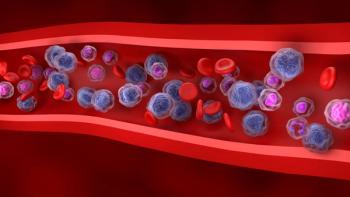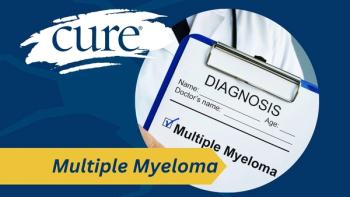
Nona Baker received a diagnosis of essential thrombocythemia in 1991, followed by polycythemia vera in 2004.

A nationally-published, award-winning journalist, Alex Biese joined the CURE team as an assistant managing editor in April 2023. Prior to that, Alex's work was published in outlets including the Chicago Sun-Times, MTV.com, USA TODAY and the Press of Atlantic City. Alex is a member of NLGJA: The Association of LGBTQ+ Journalists, and also performs at the Jersey Shore with the acoustic jam band Somewhat Relative.

Nona Baker received a diagnosis of essential thrombocythemia in 1991, followed by polycythemia vera in 2004.

Dr. Ajay Gupta sat down with CURE to explain the basics of gastrointestinal stromal tumors, highlighting what patients with this disease need to know.

Dr. Benjamin Herzberg spotlighted some of the “weird and wacky” new ideas in the field of targeted therapies for the treatment of lung cancer.

The FDA has granted fast track designation to ITM-94 as a diagnostic agent for the detection of the most common type of kidney cancer.

The FDA has approved Epkinly plus Revlimid and Rituxan for the treatment of patients with relapsed or refractory follicular lymphoma.

For U.S. Marine Corps veteran and devout marathon runner Hank Donigan, not even a diagnosis of brain cancer could slow him down.

Breaking down the rare gastrointestinal cancer, from diagnosis to treatment.

American Indian and Alaskan Native individuals face some of the highest kidney cancer burdens in the United States.

The FDA approved Komzifti in relapsed or refractory acute myeloid leukemia with a susceptible NPM1 mutation.

For Maureen Green, scalp cooling was a crucial part of her breast cancer treatment journey, as it prevented chemotherapy-induced hair loss.

These are the basics of bile duct cancer, from diagnosis to treatment.

The FDA approved Darzalex Faspro for the treatment of adults with high-risk smoldering multiple myeloma.

More than a quarter of tested patients with non-small cell lung cancer responded to Amtagvi monotherapy.

The U.S. FDA has granted orphan drug designation to M2T-CD33 for the treatment of patients with acute myeloid leukemia.

Basal cell carcinoma, or BCC, is the most common form of skin cancer globally, but it is also highly curable.

CURE spoke with an areola tattoo artist and a patient who has undergone the procedure.

In honor of Pancreatic Cancer Awareness Month, we spoke with Dr. Rosario Ligresti about rising rates of the disease in younger adults and more.

The FDA granted fast track designation to JSKN003 in platinum-resistant recurrent epithelial ovarian cancer, primary peritoneal cancer or fallopian tube cancer.

For Stephanie Wachtel, receiving a diagnosis of triple-positive breast cancer at the age of 23 was life-changing in a number of ways.

Exousia Pro, Inc. received orphan drug designation from the FDA for malignant glioma, also known as glioblastoma multiforme or GBM.

The FDA has approved Blenrep with BVd as a third-line treatment for relapsed or refractory multiple myeloma.

CURE spoke with experts about possible side effects faced by patients with breast cancer.

Exercise, as an expert explained to CURE, can have a significant positive impact on long-term outcomes for patients with cancer.

The FDA has approved Revuforj for relapsed or refractory acute myeloid leukemia with an NPM1 mutation.

The FDA has granted fast track designation to MT-125 for the treatment of patients with glioblastoma.

The FDA approved Blenrep with Velcade and dexamethasone for relapsed or refractory multiple myeloma.

What you need to know about stomach cancer, also known as gastric cancer.

The Food and Drug Administration granted fast track designation to HDP-101 for the treatment of multiple myeloma.

The MELODY study found music therapy to be effective at relieving the anxiety of cancer survivors.

Fran Curtis is a survivor of breast, appendix and skin cancer, but said bladder cancer was the toughest.